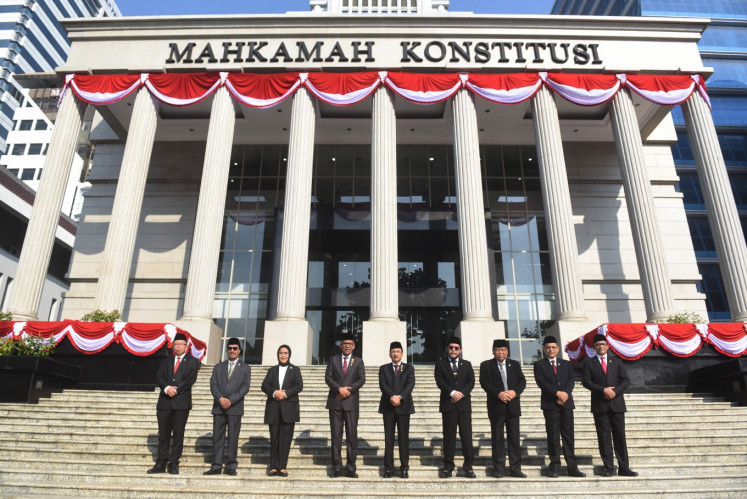Popular Reads
Top Results
Can't find what you're looking for?
View all search resultsPopular Reads
Top Results
Can't find what you're looking for?
View all search resultsPadnecwara Dances that last
Shake it off: Women rehearse at the home of Padnecwara dance studio’s founder Retno Maruti
Change text size
Gift Premium Articles
to Anyone

Shake it off: Women rehearse at the home of Padnecwara dance studio’s founder Retno Maruti. (Courtesy of Padnecwara)
Forty years and classical Javanese dance studio Padnecware is still going strong.
A number of women often eagerly practice Javanese dances on the third floor of the Jakarta Arts Institute (IKJ). On other occasions, the women rehearse at a house in the Bumi Harapan Permai complex, East Jakarta, where classical Javanese dance maestro Retno Maruti lives with her family.
The distance and Jakarta’s notorious traffic congestion do not seem to stop them from attending the rehearsals held by Padnecwara, which was founded by Retno.
Padnecwara is a Sanskrit word meaning a king’s consort. The group was formed coincidentally. “At the time I was going to stage a dance show with my fellow dancers at Taman Ismail Marzuki,” Retno said, recalling an experience in 1976.
“Because we needed a name, we agreed to call our group Padnecwara,” she added.
Retno and several of her peers finally decided to continue Padnecwara, which became a dance studio where anybody can train in Surakarta-styled Javanese dances without burdensome charges. Padnecwara is thus a pro bono project from Retno to promote classical dances and introduce them to young people.
Many young women are interested in joining the studio.
“People usually come over to learn to dance following a public performance,” said Ramadhani Prasetya, a Padnecwara dancer.
Ramadhani said information about Padnecwara was spread by word of mouth. Some even expressed their interest after scrutinizing their friends’ photos on Facebook, she added.
Among them were Maria and Suci, who work in Kuningan, South Jakarta.
“We found out about this studio from Facebook and the profile presented made us interested in learning here,” said Maria, a lawyer.
Every Sunday afternoon, women clad in long sarongs with long scarves and sashes occupy Padnecwara dance sessions at the IKJ or Retno’s house. The sessions always starts at 3 p.m. The members give monthly contributions, which are made on a voluntary basis although there is a suggested minimum.
“The minimum is adjusted to current developments but it remains very affordable,” said Retno. She wants to see a lot more members without imposing big financial burdens.
However, more experienced members start their exercises early, at 2 p.m.
“It’s meant to enable them to practice more effectively, rather than as discrimination,” said Retno.
During Padnecwara’s four-decade existence, members have certainly come and gone but some continue to dance at the studio. Many consider Padnecwara a second home, returning to the studio even if they leave Jakarta for work or other reasons.
Retno’s fame makes the studio a place to delve further into Javanese dances, especially for IKJ students.
Actress Artika Sarti Devi, for instance, chose Padnecwara to hone her dancing skills for her role in Opera Jawa. Artika also learned about the philosophy of Javanese dance under the guidance of Retno, who played a part in the movie by noted director Garin Nugroho.
Retno believes that people feel a call to dance. Therefore, they cannot be forced to keep dancing if it does not suit their inner voice. People have various reasons to dance — as a hobby, a desire to stage a show or a search for life balance.
“Usually the last motive makes people stay much longer,” added Retno, who said she believed dance was a medium of prayer and a means of achieving balance.









